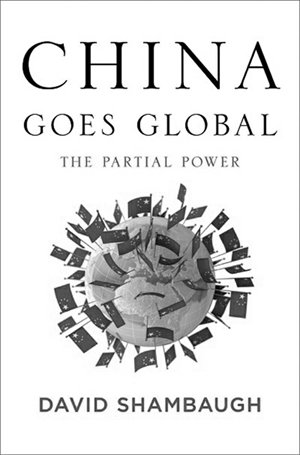Veteran China watcher puts critical eye to country’s global strengths

David Shambaugh, a professor at George Washington University, is one of the most well known and respected analysts of modern Chinese politics, foreign policy, and strategic issues.
Shambaugh's contacts in both Beijing and Washington are second to none, and his writings on China are inevitably seized upon eagerly by China watchers in one capital and US watchers in the other.
Chinese readers may find his latest book, China Goes Global: The Partial Power, both relieving and frustrating. Shambaugh has no time for the idea of a dominating, threatening China, but he also punctuates ideas of Chinese strength.
He writes that he expected to find China's global power far greater, but concludes that China had "presence, but not influence" in most of the world. His description of China as a "partial power" is carefully chosen.
Shambaugh dismisses the idea that China has a deep interest in global responsibility, stating "in my view, one does not see Beijing proactively and positively trying to resolve any global problem."
He points to China's intense and narrow interest in its own affairs and "core interests" as something that ultimately holds it to a "risk averse" foreign policy.
From a Chinese perspective, that may be a way to avoid the perceived arrogance of the US as "global policeman," but it may also genuinely restrain the country's ability to act as a significant power globally.
Shambaugh is mildly scathing of contemporary writing on China as "deep but not broad," and the book covers a huge variety of topics.
Within one chapter alone, on cultural issues, there are sections on radio, TV, newspapers, magazines, literature, film, tourism, sports, cultural institutes, fashion, education, and history.
It presents a dense and sometimes disconcerting thicket of information. In parts, one feels that the book is broad, but not deep, but when Shambaugh is on ground on which he's expert, like diplomacy and strategy, the flurry of data is synthesized into incisive and piercing commentary.
At points, the writing seems to suffer a little from the height of Shambaugh's contacts.
There are plenty of talks with the people at the top of Chinese institutions, but little of a mid-level view, yet alone a sense of the realities on the ground.
Nevertheless, Shambaugh is clearly an intelligent observer, as we can tell through his description of this newspaper as a "fine project," as "informative, with an imaginative format."
Shambaugh sees China as having a long, long way to go before it is a power on the level of the US, but at the same time highlights its impact.
With existing global institutions and rules, forged in the West-dominated order, unlikely to constrain China, Shambaugh suggests that the best course is persuasive integration, convincing Beijing that working within, if changing, the global order is its best way forward.
"There literally is no alternative but to continue to engage China and integrate it […] into the international community," he writes.